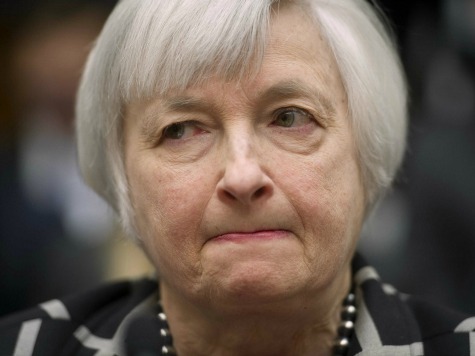
Fed Chair Janet Yellen, after declaring the U.S. Federal Reserve is abandoning Quantitative Easing – code words for money printing – is now demanding the Bank of Japan (BOJ) also curtail its Quantitative Easing.
She understands the BOJ is using monetary policy to devalue the Japanese currency as a strategy to maximize exports and minimize imports. Yellen acted because she believes Japan’s manipulation of its currency had started a trade war with China, a trade war that was about to start a real war.
Last week I reported in “Fed Chair Janet Yellen to Follow Reagan’s Taylor Rule” that Janet Yellen intends to dramatically change U.S. monetary policy by ending the Fed’s failed QE economic stimulus by following the Taylor Rule, preventing the Fed from being sucked into politically motivated currency and balance sheet manipulation. Although my comments seemed controversial at the time, the Japan Times newspaper on April 19th reported that “Experts urge BOJ to draft exit strategy.” The G-20 finance chiefs, led by Yellen, told the BOJ to end QE because its unprecedented volume purchases of “government bonds and risky assets will negatively impact global markets.” This is a dramatic departure from former Fed Chair Bernanke’s support for QE for all.
Japan Bank for International Cooperation Governor Hiroshi Watanabe told the Times that additional BOJ easing measures would not be supported by the United States, which is gradually reducing its own bond purchasing program. In the most diplomatic language possible, Watanabe said, “I’m not sure whether it is good for the United States and Japan to look in much different directions.” Watanabe told reporters earlier this month, “I don’t think the United States will support” further BOJ easing. This is diplomatic-speak for “stop money printing or the U.S. will economically retaliate.”
The Japanese government prioritizes what it calls its “Four Imperatives:” 1) Establish and maintain central authority and internal unity in the home islands; 2) Gain sovereignty over peripheral seas and islands; 3) Secure autonomy by controlling strategic approaches to the home islands; 4) Acquire necessary goods, resources, and labor by expanding military or mercantilist power farther abroad, including Siberia, Manchuria, China, and Southeast Asia. Japan used military power to achieve the “Imperatives” until it was defeated in WWII; afterward it prioritized mercantilist trade.
Japan achieved its Imperatives for fifty years as a trading nation, but the country is now suffering from a demographic collapse of its working-age population. Japan’s National Institute of Population and Social Security Research states the population began falling in 2007. From a 2010 total of 128.1 million it is projected to fall to 107.3 million by 2040. By 2060 the population of Japan will have fallen to 86.7 million, a 30% crash in just 50 years. The only comparable historic population drop of this magnitude was the 14th century black plague epidemic that killed off 1/3 of Europe.
Japan’s shriveling working-age population not only means its economy is about to shrink; the nation’s tax collections are already beginning to crash just as old age retirement benefits are about to skyrocket. Roads and bridges in Japan have already been closed because of the lack of maintenance funds. The number of vacant houses in Japan is increasing rapidly, and some municipalities have passed ordinances that allow them to demolish abandoned houses to prevent slums.
Japan’s loss has been China’s gain, as 300 million young people became Chinese workers. To regain its mercantilist power Imperative, Japan was using Quantitative Easing to devalue its currency and snatch manufacturing jobs from China.
As Japan’s devaluation began to take jobs, China retaliated in December by declaring the East China Sea, through which 88% of the goods that reach Japan pass, as Chinese territory. On April 19th China impounded the Baosteel Emotion, a 226,434-ton Japanese freighter, at the Majishan port in Zhejiang province. The action was a clear military provocation, given that a less polite word for impound is piracy.
With military tensions about to break out into military confrontation, Fed Chair Yellen took control by telling Japan to end Quantitative Easing or face consequences. Those consequences could include tariffs against $110 billion of Japanese exports to the U.S. Chair Yellen’s actions are a welcome change from her predecessor Ben Bernanke’s.
The author welcomes feedback and will respond to comments by readers.

COMMENTS
Please let us know if you're having issues with commenting.